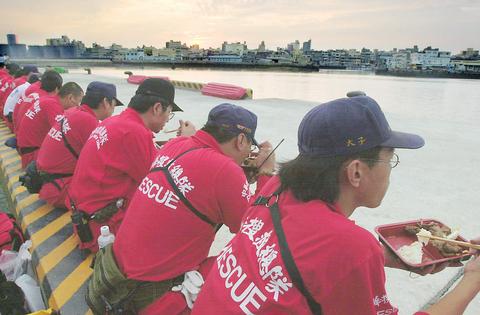Premier Yu Shyi-kun vowed to introduce a reform plan within two weeks to privatize China Airlines yesterday as Saturday's fatal plane crash continued to grip the political scene.
Meanwhile, the legislature, slated to question the premier over his six-year economic plan, bickered over who should take the political blame for the disaster.
"The ultimate remedy lies in privatization," Yu said when asked to comment on China Airlines in the light of the crash. "I believe that the company will improve its management and operations after being privatized."

PHOTO: CHANG CHUNG-YI, TAIPEI TIMES
To speed up the effort, Yu promised to come up with a reform plan in two weeks.
A quasi-governmental organization, the China Aviation Development Foundation has a 71 percent stake in the former state-run carrier. Many of the foundation's board members are retired government or military officials. They manage about NT$50 billion (US$1.45 billion) in assets.
The premier admitted that previous efforts to privatize the carrier had not gone smoothly, but said he is optimistic now that the economy has shown signs of recovery.
He also pledged to take disciplinary measures against any officials found to be negligent once the crash probe arrives at a conclusion.
Yu's remarks failed to satisfy lawmakers, however.
KMT legislator Wu Den-yi (
Dubbed "Challenging 2008," the program is expected to cost NT$2.6 trillion and help the nation achieve an economic growth of 5 percent and create 700,000 job opportunities, among other initiatives, over the next six years.
Wu further pointed out that Tsay Jaw-yang (
"But today Tsay is chairman of the China Aviation Development Foundation while Tsai is vice transportation minister. Are these arrangements compliant with the principle of political accountability?" Wu asked.
Meanwhile, DPP lawmaker Charles Chiang (
"There have been so many domestic air accidents and the council has failed to find out what caused them," Chiang said. "All he does is travel to other countries to put on public relations shows."
Chen Chong-yi (
He urged consumers to boycott China Airlines to force the company to engage in some soul-searching.
Some TSU lawmakers attributed the tragedy to the carrier's use of the word "China" in its title.
To avoid recurrence of bad luck, TSU legislators Lo Chih-ming (

POSITIVE DEVELOPMENT: Japan and the US are expected to hold in-depth discussions on Taiwan-related issues during the meeting next month, Japanese sources said The holding of a Japan-US leaders’ meeting ahead of US President Donald Trump’s visit to China is positive news for Taiwan, former Japan-Taiwan Exchange Association representative Hiroyasu Izumi said yesterday. After the Liberal Democratic Party’s landslide victory in Japan’s House of Representatives election, Japanese Prime Minister Sanae Takaichi is scheduled to visit the US next month, where she is to meet with Trump ahead of the US president’s planned visit to China from March 31 to April 2 for a meeting with Chinese President Xi Jinping (習近平). Japan and the US are expected to hold in-depth discussions on Taiwan-related issues during the

‘LIKE-MINDED PARTNER’: Tako van Popta said it would be inappropriate to delay signing the deal with Taiwan because of China, adding he would promote the issue Canadian senators have stressed Taiwan’s importance for international trade and expressed enthusiasm for ensuring the Taiwan-Canada trade cooperation framework agreement is implemented this year. Representative to Canada Harry Tseng (曾厚仁) in an interview with the Central News Agency (CNA) said he was increasingly uneasy about Ottawa’s delays in signing the agreement, especially as Ottawa has warmed toward Beijing. There are “no negotiations left. Not only [is it] initialed, we have three versions of the text ready: English, French and Mandarin,” Tseng said. “That tells you how close we are to the final signature.” Tseng said that he hoped Canadian Prime Minister Mark Carney

President William Lai (賴清德) yesterday bestowed one of Taiwan’s highest honors on Saint Vincent and the Grenadines (SVG) Ambassador Andrea Clare Bowman in recognition of her contributions to bilateral ties. “By conferring the Order of Brilliant Star with Grand Cordon on Ambassador Bowman today, I want to sincerely thank her, on behalf of the Taiwanese people, for her outstanding contribution to deepening diplomatic ties between Taiwan and SVG,” Lai said at a ceremony held at the Presidential Office in Taipei. He noted that Bowman became SVG’s first ambassador to Taiwan in 2019 and

A man walks past elementary school artworks at the Taipei Lantern Festival in Ximen District yesterday, the first day of the event. The festival is to run from 5pm to 10pm through March 15.